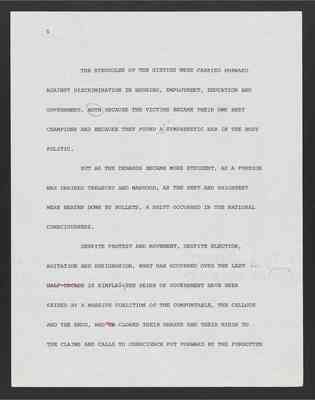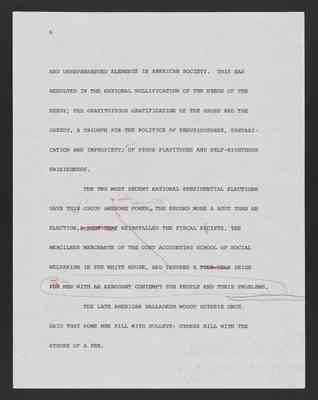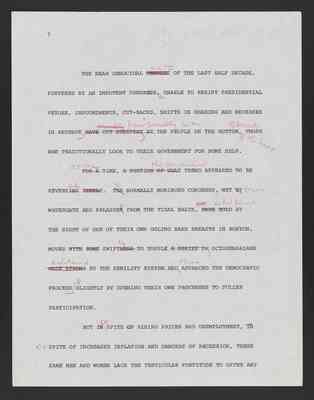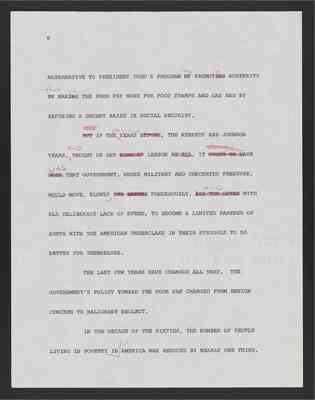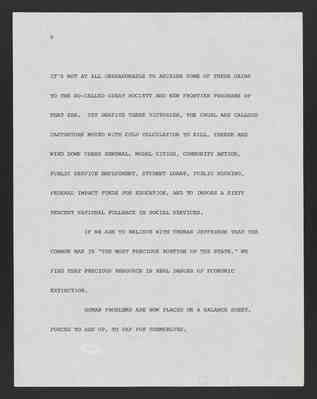Pages
11
5
The struggles of the Sixties were carried forward against discrimination in housing, employment, education and government, both because the victims became their own best champions and because they found a6 sympathetic ear in the body politic.
But as the demands became more strident, as a foreign war drained treasury and manhood, as the best and brightest were beaten down by bullets, a shift occurred in the national consciousness.
Despite protest and movement, depite election, agitation and resignation, what has occurred over the last ten years half decade is simple--: the reins of government have been seized by a massive coalition of the comfortable, the callous and the smug, who 've closed their hearts and their minds to the claims and calls to conscience put forward by the forgotten
12
6
and unrepresented elements in American society. This has resulted in the national nullification of the needs of the needy; the gratituitous gratification of the gross and the greedy; a triumph for the politics of penuriousness, prevarication and impropiety; of pious platitudes and self-righteous swinishness.
The two most recent national presidential elections gave this7 group awe for of men with an arrogant contempt for people and their problems in it inaugurated power. The second, more a rout than an Election, a rout that reinstalled the fiscal fascists, the merciless merchants of the cost accounting school of social welfarism in the White House and insured afour-year reign
The late American balladeer Woody Guthrie once said that some men kill with bullets; others kill with the stroke of a pen.
13
7
The near genocidal resultsacts of the last half decade, fostered by an impotent Congress, unable to resist Presidential vetoes, impoundments, cut-backs, shifts in sharing and reverses in revenue, have cut sharpest athave cruelly cut the people on the bottom of the heap, those who traditionally look to their government for some help.
For aAt one time, a portion of thatthe genocidal trend appeared to be reversinged. itself. TheA normally moribund Congress, wet byfrom Watergate and splashesd from the tidal basin, made boldemboldened by the sight of one of their own ogling bare breasts in Boston, moved with some swiftnessly to topple a series ofoctogenarians made strongbolstened by the senility system, and then advanced the Democratic process8 slightly by opening their own processes to fuller participation.
But indespite ofrising prices and unemployment, indespite of increased inflation and dangers of recession, these same men and women lack the testicular fortitude to offer any
14
8
alternative to President Ford's program ofto promoteing austerity bythat makinges the poor pay more for food stamps and gas and by refusing a decent raise in social security.
ButIf the previous years before, the Kennedy and Johnson years, had taught us any kind oflesson at all, it ought to have beenwas that government, under militant and concerted pressure, would move, slowly, and ratherponderously, all too oftenand with all deliberate lack of speed, to become a limited partner of sorts with the American underclass in their struggle to do better for themselves.
The last few years have changed all that. The Government's policy toward the poor has changed from benign concern to malignant neglect.
In the decade of the sixties, the number of people living in poverty in9 America was reduced by nearly one third.
15
9
It's not at all unreasonable to ascribe some of these gains to the so-called great society and new frontier programs of that era. Yet despite these victories, the cruel and callous castrators moved with cold calculation to kill, freeze and wind down urban renewal, model cities, community action, public service employment, student loans, public housing, federal impact funds for education, and to impose a sixty percent national pullback in social services.
If we are to believe with Thomas Jefferson that the common man is "the most precious portion of the state," we find that precious resource in real danger of economic extinction.
Human problems are now placed on a balance sheet, forced to add up, to pay for themselves.
